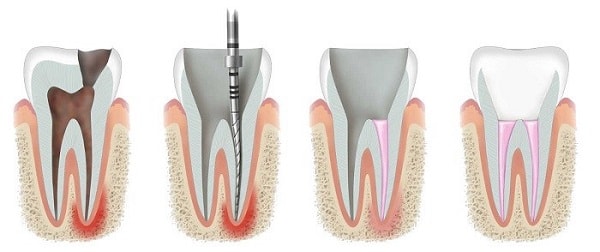Root Canal Specialist in Tehran-Iran

Dentists can save your teeth when you visit them for a root canal. dentists can remove the infected tissues inside of a tooth, fill the area with medicated materials, and cap the tooth with a dental crown for protection.
root canal treatment is a type of endodontic therapy that is often recommended if the tooth pulp and nerves become infected or damaged. When left untreated, this type of infection and disease may cause the tooth to die and necessitate tooth extraction. To restore the health of the tooth and avoid the need for extraction, skilled dentists will remove the infected and injured tissues from within the tooth, clean the tooth, and fill it with a medicated material. dentists will then cap the tooth with a restoration, such as a dental crown, to return the tooth to its original shape and structure. In most cases, a root canal treatment in Tehran can be completed in only one or two comfortable visits to office.
When Do I need A Root Canal Treatment?
The pulp is the soft tissue that contains nerves, blood vessels and connective tissue. It lies within the tooth and extends from within the crown of the tooth (that portion of the tooth that is visible) to the tip of the root in the bone of the jaws.
When the pulp is diseased or injured and can’t repair itself, it dies. The most common cause of pulp death is a cracked tooth or a deep cavity. Both of these problems can let germs (bacteria) enter the pulp. Germs can cause an infection inside the tooth.
If left untreated, the infection can lead to the following:
- An abscess (pus-filled swelling) forming around the root of the tooth.
- Destruction of bone surrounding the root of the tooth. This may allow the abscess to burst through the weakened bone to drain pus into the mouth through the gums.
- Severe pain
Root canal treatment in Iran aims to stop this infectious process taking place within the root canal system and to eliminate pain. This will allow you to keep the tooth instead of extracting it.
After root canal treatment, the tooth becomes very brittle and weak. It may crack or fracture more easily when you chew on it. Protecting the biting surface with a crown or an onlay will help to prevent an irreparable fracture from occurring soon after root canal treatment is completed. This protection is mandatory for all root canal treated teeth that are subjected to high biting forces.
Temporary Treatment for Toothache Before Root Canal
Medications available for the temporary relief of toothache can be purchased at pharmacies in Tehran

Novafen

Dentol
Various methods are employed to temporarily alleviate toothache, and the best medications and substances needed to temporarily relieve dental nerve pain are briefly explained in two accessible categories below.
Access to a pharmacy in Tehran: If you have access to a pharmacy, the best medications, in order, include ibuprofen, gelofen, and dental pain relief tablets available at the pharmacy. These tablets consist of 200 milligrams of ibuprofen, 40 milligrams of caffeine, and 325 milligrams of acetaminophen, providing excellent temporary relief for dental pain.
The next medication is Dentol solution, which, through the use of a herbal solution, aids in reducing dental pain and infection.
No access to a pharmacy: Use of toothpaste: Toothpaste containing temporary pain relievers like benzocaine can be applied. To use, apply a small amount of toothpaste to the painful tooth.
Ice pack: Place an ice pack in a thin plastic bag and apply it to the painful area for 15-20 minutes. Be cautious not to place the ice directly on the tooth, as it may cause damage.
Application of gentle pressure: Apply gentle pressure to the painful tooth and its surrounding area using your fingers. This may help reduce the pain.
Types of Tooth Root Canal Procedures
Tooth root canal treatment is a complex therapeutic approach that can be performed in various ways depending on the conditions and status of the tooth. Below, I will explain different types of tooth root canal procedures:
1. Single-Visit Root Canal: In this method, the tooth root canal and filling with gutta-percha are completed in a single session. This approach is suitable for teeth with relatively simple nerve conditions and minimal infection.
2. Multi-Visit Root Canal: In this method, the tooth root canal procedure is performed in several sessions. In the initial sessions, the nerve of the tooth is removed, and the space is cleaned. Subsequent sessions involve filling the space with gutta-percha. This method is appropriate for teeth with severe infection or complex nerve structures.
3. Laser-Assisted Root Canal: This technique involves using a laser to clean and disinfect the inside of the tooth. It may be less painful and reduce recovery time.
4. Pulpotomy: This method is typically used for nerve treatment in deciduous (baby) teeth. Here, the nerve is removed, and the space is filled with mineral materials.
5. Microscopic Endodontics: Medical microscopes are used for a more precise execution of tooth root canal procedures. This method allows dentists to have a more accurate view of the internal structures of the tooth.
Additionally, depending on the infection status and its severity, a dentist may decide to perform an Apicoectomy, a surgical root canal procedure, to remove infected tissues from around the tooth.
The choice of the root canal procedure depends on the exact condition of your tooth, and your dentist will recommend the best method after a thorough evaluation and diagnosis of the problem.

Tips for preventing root canal infections
There are several things you can do to help prevent a root canal infection, which involves taking care of your teeth after the procedure:
- Brush and flossat least twice a day.
- Use a gentle, antiseptic mouthwashfor the first few days after a root canal. Use it as often as you’d like afterward, too.
- Use an over-the-counter pain medicationlike ibuprofen for soreness after treatment.
- Return to your dentist for a final crown or permanent restorationas soon as possible. This will seal the root canal from bacteria and protect your tooth.
- Get dental cleanings at least twice a yearto keep your teeth generally healthy and catch decay or infections early.
- See your dentist right awayif you notice any early signs of infection.




